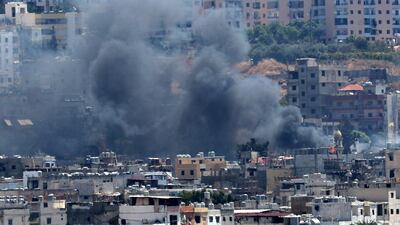The Joint Palestinian Security Forces have arrested a prominent suspect behind the attack on the Iranian embassy in Beirut in 2013.
Army intelligence officials arrested Bahaa Hujeir, a member of the Lebanese-based Al Qaeda linked group, Abdullah Azzam Brigades, on Tuesday night, local media reported.
Hujeir, often referred to as an "influential terrorist" has been hiding in the Ain Al Hilweh camp since the twin bombing that rocked Iran’s embassy compound, killing at least 23 people including an Iranian cultural attache. The deadly explosion left burning wreckage and bodies across the debris-strewn street.
Ain Al Hilweh is off-limits to Lebanese security forces and as such has become a haven for hard-line extremist groups.
Sheikh Jamal Khattab, an influential preacher in the camp who previously had ties to extremist groups confirmed to The National that Hujeir was in custody.
Sheikh Jamal has previously worked as a mediator between Palestinian national forces and hard-line extremist groups.
_________
Read more:
How Lebanese descendants are shaking Latin America's politics
Embassy bombing sparks great fears for Lebanon
Iran using civilian flights to smuggle weapons to Hezbollah
__________
The Abdullah Azzam Brigades claimed responsibility for the blast in 2013 and threatened further attacks if Iran does not withdraw its forces from Syria, where they are backing President Bashar Al Assad’s war against rebel groups.
Ain Al Hilweh has been gripped by deadly clashes as security forces fight extremist groups that control areas of the camp.
The joint security forces are a militia formed by Palestinian nationalists to combat extremism. They were set up to fight ISIS and are made up predominantly of members of Fatah and Hamas.
In the most recent instance of violence a man identified as Haitham Al Saadi, with ties to Fatah, was shot dead.
Security forces identified the suspected killer as Mohammed Arqoub.
"Haitham Al Saadi was shot several times in the head, and the incident took place in the Safsaf neighbourhood, but his shooter Mohammed Arqoub is not affiliated to an [extremist] group," Sheikh Jamal said, adding that the suspect is still at large.
Sheikh Jamal says he is working with Mohammed Arqoub's family to have the alleged perpetrator handed in to authorities.
An army spokesman refused to comment on the incident but told The National that their role is to clear the camp of terrorists and prevent any extremists from entering the area.
Schools in the camp remained closed on Wednesday after students and teachers failed to show up, fearing further violence.
Protesters and relatives of the victim demanded that Palestinian authorities exert pressure to have the perpetrator handed in.
Some 270,000 Palestinian refugees live across the 12 camps and numerous gatherings throughout Lebanon, having been displaced by the founding of Israel in 1948 and the consequent conflicts.
Although Lebanon has been largely stable in recent years, it previously suffered a period of sectarian clashes and terrorist attacks linked to the Syrian conflict.


